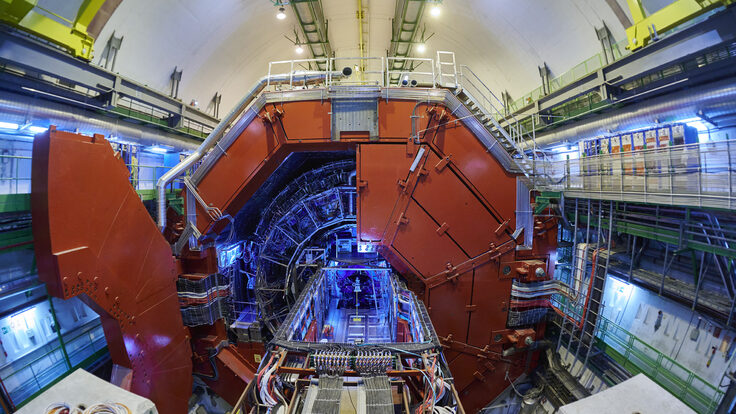
Joe Incandela has begun his term as a Deputy Spokesperson of CMS.
Joe Incandela of the University of California, Santa Barbara has begun his term as one of two deputy spokespeople for the CMS experiment collaboration at the Large Hadron Collider. Incandela and his fellow deputy spokesperson Albert De Roeck of CERN were appointed in July 2009 by new CMS spokesperson, Guido Tonelli.
Tonelli appointed De Roeck and Incandela, exotica group convener and deputy physics coordinator respectively, to their two year posts in a break with recent tradition. In the past, one deputy has been involved with activities closer to the hardware of the detector and the other with activities that are closer to physics. Tonelli appointed two deputies from physics in recognition of the major transition underway from commissioning hardware to data-taking and first physics with LHC collisions.
“To be deputy spokespersons at this time is a great privilege because we are in front row seats at a historical event. I’m very honored to be in this position,” explains Incandela.
In addition to diplomatic and administrative duties like guiding visitors and coordinating with funding agencies, De Roeck and Incandela need to follow the progress of many areas of the CMS experiment with emphasis on the chain of events from data-taking to final results. The two have divided up various aspects of the CMS program in order to follow things in greater detail but they plan to stay in close contact so that both are always on top of the main issues.
“I would say that the biggest and hardest part about this job is that there’s a huge amount of information that you have to track. There’s a huge amount of reading and often you’re just keeping up with everything,” observes Incandela.
Among new responsibilities, Incandela is especially excited about the new cross-coordination meetings in CMS that he will co-chair with De Roeck. De Roeck and Incandela believe that these meetings will assist CMS top coordinators in their planning, particularly where their goals impact other coordination areas.
“Coordinators often need to know from other coordinators if it is okay to go ahead with some new task or change an existing task, but they do not have an opportunity to come together at one time to understand the implications and to schedule the work. Having the deputy spokespeople chair these meetings should help,” explains Incandela. “It will be a lot more efficient this way and will allow us all to get synchronized with each other.”
Though the position will have its challenges, Incandela feels his experiences over the past three years as deputy physics coordinator have provided him with good preparation. Incandela joined the CMS collaboration in 1997 when he formed the US silicon tracker group that built a large fraction of the CMS detector’s modules.
For Incandela, part of what makes working in particle physics and with an experiment like CMS so exciting is its position at the forefront of discovery. He compares physics to art, a field with which he is familiar. A student of painting and sculpture at the Art Institute of Chicago from age seven to age seventeen, Incandela had intended to pursue a career in glass sculpture. It was while studying chemistry to improve his understanding of the medium that he discovered and became fascinated by physics.
“Art can produce contributions to our culture that will last the ages and so can particle physics. We’re creating and finding out new things, and we believe that what we find will be an enduring part of our culture and history.”
Also important to Incandela is the atmosphere of collaboration that he sees as essential to CMS. He recalls how he was initially concerned about joining such a large experiment. As a deputy spokesperson, Incandela hopes to encourage those with an interest in CMS to become involved.
“CMS is a really fantastic collaboration and it is very open. The people that come in and work and get involved can quickly find themselves in positions of responsibility if that’s what they want.”
Incandela especially wants to be a contact person for anyone who has concerns or uncertainties about joining the collaboration. The current spokesman and deputies hope to continue to set a tone in the experiment that establishes a lasting, open intellectual environment.
“We want people to enjoy their experience on CMS. Competition is unavoidable but we want a healthy competition. We want people to relax and really enjoy their experience and so far as I can see, it’s coming together really well.”
by Daisy Yuhas






